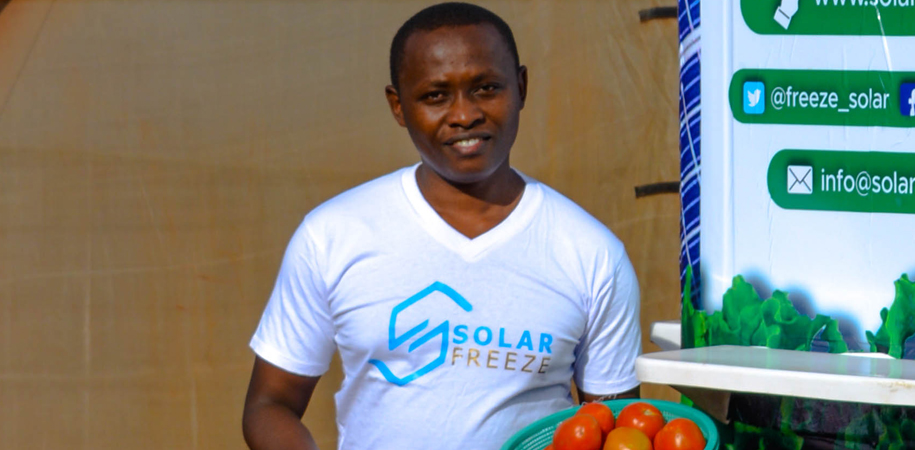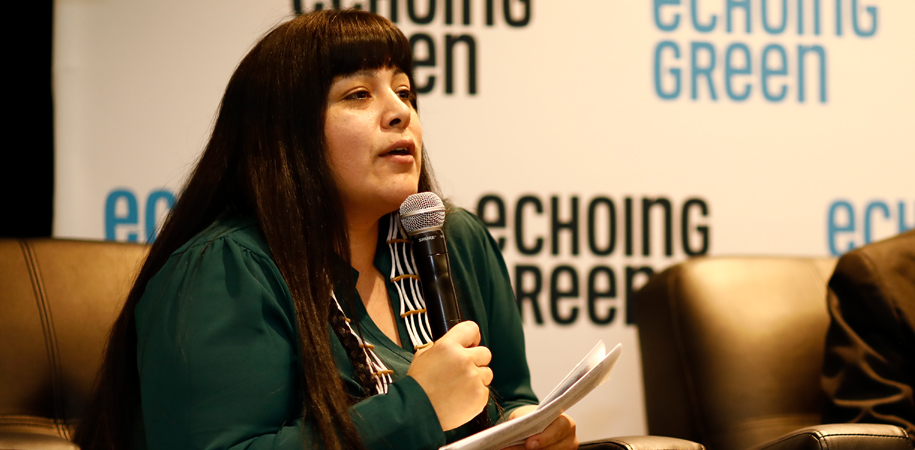
https://echoinggreen.org/news/state-of-social-entrepreneurship-2020/
We know these data underscore the significant role of barriers to capital, networks, and other resources in influencing whether a social entrepreneur’s venture will succeed. But emerging responses to some of these barriers among key actors in the field make us hopeful for a growing social change movement that prioritizes trust, partnership, and shared outcomes.
As Echoing Green continues our efforts to foster an ecosystem where those closest to the problems are supported to lead the solutions, it is clear that building coalitions among founders, funders, and communities has catalytic potential for creating lasting social change. This work takes all of us.
Read on to explore our data set, Fellow perspectives, and the following trend outlooks offered by Ben Beers, Specialist on Echoing Green’s Knowledge team.
For more than 30 years, Echoing Green has acted on the belief that supporting early-stage leaders, sharing information, creating space for difficult conversations, and fostering personal relationships across economic, political, and social power dynamics can create a foundation for radically revisioning how entrepreneurship serves the world. We have built a network of leaders who organize their communities, research and build tools to meet essential needs, and advocate to dismantle inadequate and oppressive systems. This community of leaders is inclusive across race, gender, class, sexual identity, religious affiliation, and geography. We bring them together to discuss shared challenges and opportunities, connect their knowledge and perspectives, and to build a network of power. Our funding is directed to leaders in the early stage of their efforts because we know the biggest hurdle facing them isn’t the validity of their leadership, but the barriers they face in attaining resources. We aim to help them overcome these barriers at the earliest stages knowing that the impacts of these hurdles often compound with time. Every year, Echoing Green solicits applications from leaders like these across the world who are taking action to improve their communities. Data from those applications helps us to better understand who these leaders are and what problems they are trying to solve. The current global health crisis underscores the structural inadequacy of systems that continue to fail communities impacted by oppressive systems. While we cannot predict what the work of our field will look like when the world emerges from the pandemic, the crisis makes real what years of our data have shown—we must dismantle the root causes of structural inequality. Yet, we must act quickly, and there is reason for hope. We see stories from across the world of communities organizing and individuals undertaking selfless acts for the sake of our shared wellbeing. Our community is no different: Echoing Green is privileged to witness our incredible leaders mobilize and organize themselves to combat this crisis from all angles. At the same time, the pandemic highlights the importance of dismantling systems of oppression. If we are to succeed in addressing the climate crisis, in creating equitable economic systems, and in building networks across the boundaries built to separate us, then we must first understand the economic and political structures that have created and exacerbated these conditions in the first place. With shared understanding, we can act together to transform and dismantle these systems and rebuild them to prioritize our human needs—for now and for any challenges to come. The themes of our early-stage data analysis and the messages from our Fellow community are clear: it is imperative for funders and our colleagues in the field to understand and dismantle the barriers to capital many early-stage social entrepreneurs face, as well as the systems of economic and political power that create those barriers. In our 2019 State of Social Entrepreneurship report, we explored the concentration of capital distributed to early-stage social enterprises, and our data illustrated that the majority of funding went to a small percentage of those organizations. This year, we wanted to take a step back and understand the broader context of systemic inequality. Wealth and power are highly concentrated throughout nearly all global societies. According to the Institute for Policy Studies, the wealthiest 1% of the global population controls 45% of all world wealth. This inequality is replicated within philanthropic systems and has ramifications for how the organizations with the field operate. This concentration is largely a result of exploitative economic systems that prioritize the profit and position of those that control the most powerful industries. With the power to extract resources for their own interests, these institutions often leave front-line communities without the resources to meet their basic human needs—or grow their organizations in the cases of leaders like our applicants. These impacts leave them having to use their time and resources to fill gaps as a result of reduced wages, lack of labor protections, or ecological damage resulting from systemic oppression. It should be acknowledged that philanthropy often receives its funding from institutions that have benefited from these extractive systems. Many entities that distribute philanthropic dollars are in the position to, both actively and passively, prevent dollars from flowing to truly transformational efforts to transform global economic structures. These systems of economic exploitation are structurally predicated on the existence of oppression along lines of race, class, gender, sexual orientation, and geography. They serve as the foundation for ideologies of cultural segregation, alienation, exploitation, and violence. Those who face these forms of oppression are systematically denied the resources needed to build new, sustainable networks of economic and political power, denying humanity the grassroots leadership most needed in the highest levels of societal decision-making. Brandon Anderson, Founder of Raheem Our data provides a window into understanding these power dynamics by observing both applicants who have already secured funding and those who have yet to secure that support, in the context of gender, race, class, and geographical boundaries. The state of climate leaders in Africa shows how these power dynamics function. This year, 40% of all applications to Echoing Green proposed work on the African continent—largely in Nigeria, Kenya, Uganda, Ghana, South Africa, and Cameroon. This is the first time in our history where applications from Africa nearly match those from North America. This increase was most prominent in climate change work, with 52% of all climate-focused applications proposing work in Africa. Our data shows that applications from Africa report significantly lower amounts of funding received across the board. This is a consistent narrative in our data analysis, which also aligns with a broader historical context frequently raised by our Fellows: the ways in which colonialism, widespread economic extraction, and philanthropies’ relationship to Africa reinforce exploitation. Ruramiso Mashumba, founder of Mnandi Africa Research conducted by the African Union and the Intergovernmental Panel on Climate Change (IPCC) highlighted that Africa is particularly impacted by climate change disruption for both environmental and developmental reasons. The UN notes that “temperature increases in the region are projected to be higher than the global [average] temperature increases.” The Brookings Institute notes that “Africa is the continent that contributes least to global warming in both absolute and per capita terms… Yet, despite its low emissions, Africa is one of the region’s most vulnerable to climate change.” During the African Union’s 2020 Summit focusing on decreasing sectarian violence, it was noted that climate change is an exacerbating factor in societal challenges: drought, desertification, water stress, and scarcity of resources can heighten tensions and contribute to breakdowns in governance. The United Nations projects that climate change will decrease Africa’s GDP by 2–4% and that climate adaptation costs could rise to upwards of USD 50 billion per year by 2040. The widespread impacts of climate change are recognized in our applications. Proximate leaders from our applicant pool strive to address climate change across a spectrum of communities and issue areas—reinforcing the fact that climate change affects every sector of society and is particularly consequential for those without the resources to adapt. Dysmus Kisilu, founder of Solar Freeze As the philanthropic community and global governments contemplate what we must do to address this growing threat of climate change, we must internalize the historical context of the region, avoid the mistakes of the past, and accurately identify the global causes of climate change. Echoing Green has learned a key lesson through our work: there must be a movement led by committed individuals and organizations willing to break down power dynamics and operate in tandem toward equity and sustainability. We believe that data collection and analysis in support of transformative change can contribute to those efforts, but our methods must evolve. We all must strive to ensure our data collection and analysis efforts do not promote or embed the values of an inequitable system in which our communities operate. If we limit our data collection and analysis to approaches that standardize, categorize, and evaluate our work based on the goals of funders who are not committed to substantive systemic changes, we will fail to achieve the transformative change we seek. Rather, we must prioritize the needs of front-line communities and use our resources to build a base of information that supports those leaders and their organizations in efforts to advocate for their interests. At Echoing Green, we struggle with the reality that our data—on its own—is a limited representation of the issues our community faces and isn’t reflective of every constituency within our broad community. We know our limited data also limits our imagination of what can be accomplished with it. However, we have been thoughtfully critiqued from members within our own community on a critical point: it does not matter that our data is limited because even limited data—in the hands of committed individuals—can be instrumental in supporting their efforts to make the case for their own communities needs and power. Percilla Frizzell, Founder of Sacred Generations Understanding the need for open data among our community, we have made the decision to release several years of our application data to the field. We hope this data, while limited in its reach, can help our field develop shared understanding and collaborative methods. This anonymized data was collected through Echoing Green’s application process for the years 2016-2020. All data was self-reported by applicants. Aggregations were completed by Echoing Green staff. Echoing Green is proud of our work identifying, supporting, and connecting best-in-class social impact leaders. We firmly believe that raising up the voices of these leaders and building pathways toward trust-based philanthropy is a critical component of equitable and accessible funding for proximate leaders, who are best equipped to solve the world’s biggest problems. It is necessary for philanthropies, foundations, nonprofits, and intermediary organizations—and specifically, we who work in these institutions—to ensure we do not perpetuate the systems creating injustice and inequality. This requires us to identify and name the systems that reinforce inequity, identify who benefits from those systems, and work toward dismantling them. In this moment of time, there are clear opportunities to build new systems through coalition-building and co-designing alongside front-line, grassroots leaders. By working toward a true democratic movement that acknowledges inequitable power dynamics and historically biased funding decisions, we can create better systems that allow for more unrestricted capital directed toward leaders closest to the solutions. If we are to move forward, we must redistribute resources back into democratic forums of economic and political decision-making controlled by the communities from which the resources were extracted. It is a difficult truth, but one that must be admitted openly if we are to build the understanding necessary to move forward: we live in a world where power and wealth are distributed inequitably and where those who control capital have extraordinary ability to determine what work is funded and who is funded to do it. Those who hold disproportionate control over these material resources can exert pressure to maintain those exploitative systems for their own benefit. It is incumbent on those who wish to build an equitable, collaborative world to take tangible steps to transform this dynamic. Our Fellows, applicants, and we at Echoing Green often depend on the financial resources of large foundations, corporate institutions, governmental agencies, and wealthy individuals to fund our work. This model often, through not always, puts us in a disadvantageous structural position where we find ourselves debating whether we should moderate our vision for social justice. Put bluntly, we experience both systemic pressure and personal incentive to operate in ways avoidant of, if not aligned with, the interests of extractive and exploitative systems. At this moment, more than any other in our institutional history, we feel the contradictions of this position. We worry about what open criticism of unfettered capitalism, the financial industry, or other broad economic systems might mean for the welfare of us and our institution—especially in these trying times. We feel the unspoken but powerful pressure to moderate our demands, yet look at the world and know that we must call for equitable, democratic systems of economic and political control. Echoing Green is an optimistic institution that believes change is possible with dedicated, committed individuals from all walks of life. If we are to radically re-envision how entrepreneurship works, the whole of our community—from funders to Fellows—we must always center our work in honesty and solidarity with the communities and front-line leaders we serve. This is especially important when they call on us to join in the struggle to dismantle the practices of exploitative systems—including when our own embodies them. We will continue to build bridges and foster conversations with those in our funding community, while openly acknowledging the structural dynamic shared between us. We know that many individuals and institutions deeply understand the challenges facing us and the struggles toward justice. We call on these committed individuals who control economic resources to do their part and take immediate steps to: The challenges that we face can only be solved if we—all of us—work together. We know that the Echoing Green community is dedicated to solving these problems and that collectively, we can transform how philanthropy works and serves the world. Together, we can break down barriers and welcome more voices into our methods of decision-making. Together, we can shift the dynamics of our industry to meet the obligations of equity and justice. Together, we can build new networks of power committed to ensuring everyone lives a dignified life. These challenges will not will be easy to solve, but we must—and will—rise to the meet them. Join us. To learn more about our work addressing the structural inequities in funding social change leaders and how we’re coalition-building to tackle barriers to capital, check out our Skoll World Forum session co-hosted with the Skoll Foundation and The Bridgespan Group, Barriers to Capital: Overcoming Racial Bias in Funding. The report was authored by Ben Beers with contributions from Liza Mueller, Cara Lee, and Janna Oberdorf. Access our past State of Social Entrepreneurship reports here.
The COVID-19 pandemic has reiterated the urgency of this analysis.
See what our Fellows are doing to combat COVID-19
The 2020 Data at a Glance
For the 2020 Fellowship, Echoing Green received 2,634 applications from 161 countries and territories across the world, an increase of 6.4% from last year.
Theme 1: Lack of Capital for Front-line Communities
Global Economic Inequality
Funding Disparities: Gender, Ethnicity, and Geography
 The reason you see Black people struggling to raise money, build a company, or start a movement, is not because they aren’t good at it. It’s certainly not because they aren’t as capable as people who have the resources. It’s because of the way this all started out. The U.S. was founded on and continues to operate with the exploitation of Black labor. If you understand that, you’ll come to this work more humble as a funder.
The reason you see Black people struggling to raise money, build a company, or start a movement, is not because they aren’t good at it. It’s certainly not because they aren’t as capable as people who have the resources. It’s because of the way this all started out. The U.S. was founded on and continues to operate with the exploitation of Black labor. If you understand that, you’ll come to this work more humble as a funder.
Theme 2: The State of Climate Leaders in Africa
Climate Leaders in Africa Receive Less Funding

Most capital goes to big NGOs that collect data or conduct workshops and conferences that don’t really help the very vulnerable. Funders need to support entrepreneurs who are in proximity to the problems. Let’s meet entrepreneurs where they are and help them grow.
Impacts of Climate Change in Africa

If funders work with climate innovators in Africa, the domino effect will largely be felt through a sustainable, smart way of business; reduction in poverty rates; and gender equality.
Theme 3: The Need for Collaborative Action and Shared Data
Lack of Data Around Underrepresented Leaders
 Indigenous innovation deserves inclusive data and investments in our homelands. Our worldview of healing is largely untapped in the social impact community, but our collective wellbeing requires listening to the traditional stewards of the land.
Indigenous innovation deserves inclusive data and investments in our homelands. Our worldview of healing is largely untapped in the social impact community, but our collective wellbeing requires listening to the traditional stewards of the land.
Download our anonymous data-set
Conclusion and Calls to Action
Toward True Democratic Movement Building
Acknowledgements










Add new comment